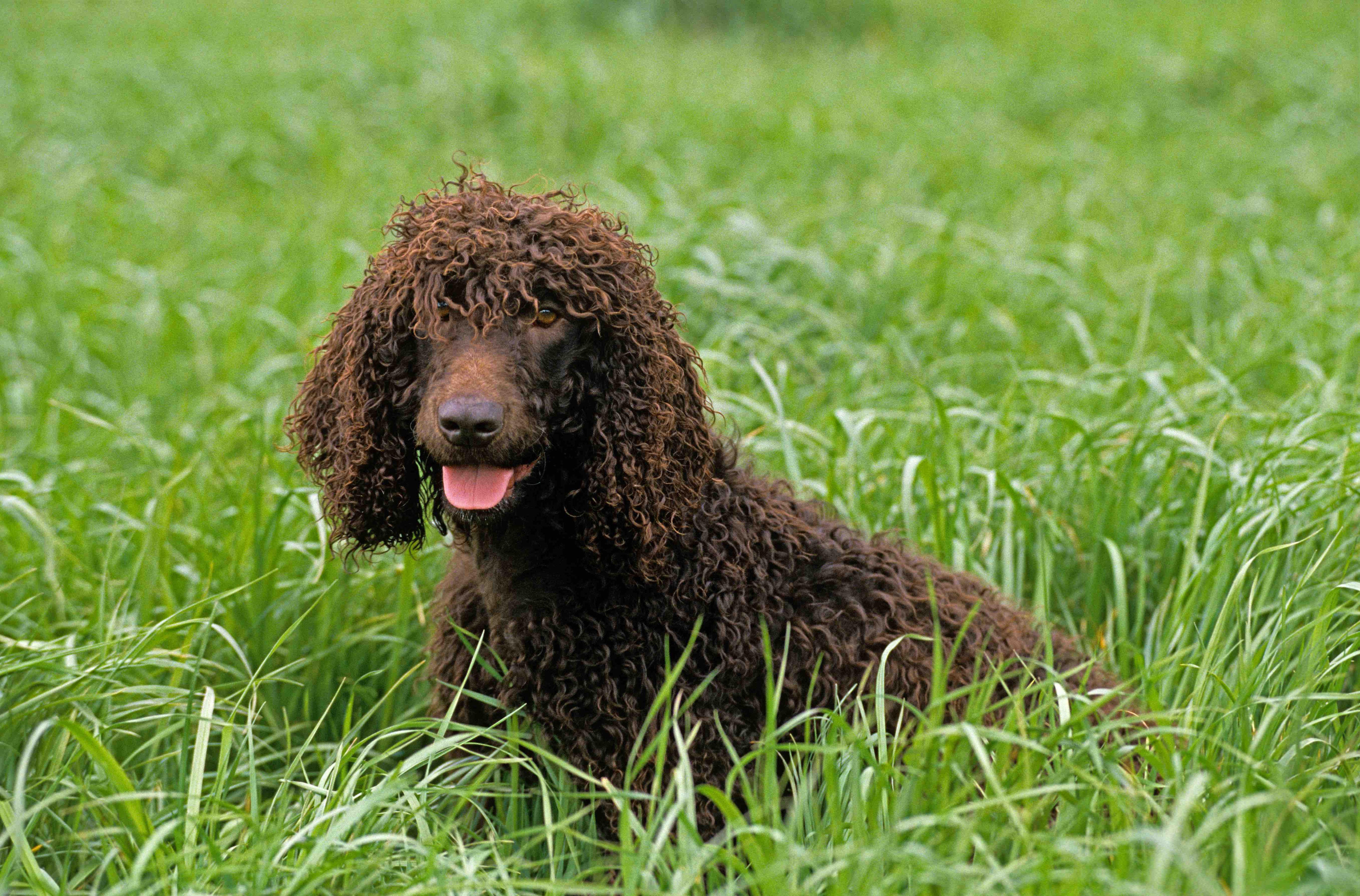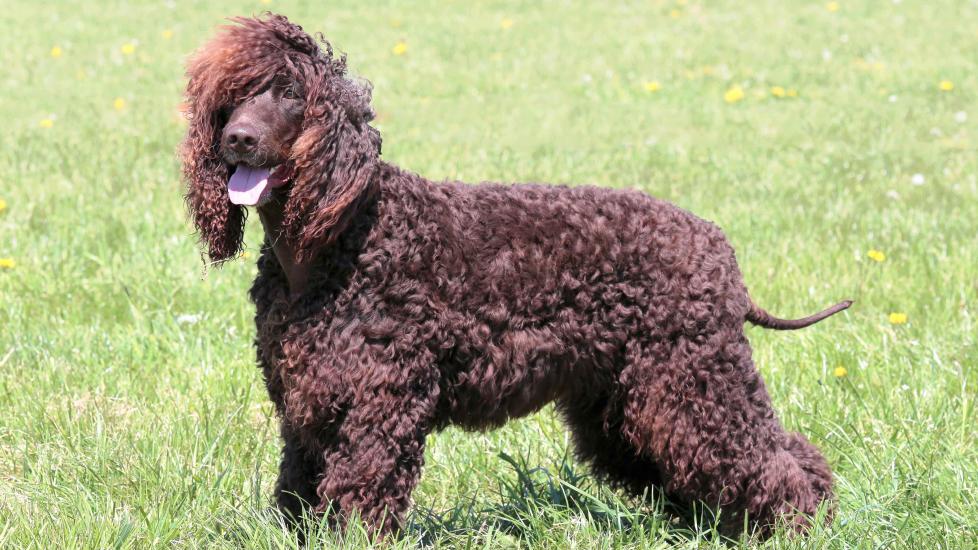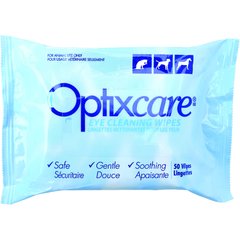Irish Water Spaniel
Adobe Stock/Vincent
Hailing from Ireland, Irish Water Spaniels were originally bred as hunting dogs, prized for their ability to retrieve game from water. Notably, they are one of the oldest and rarest spaniel breeds, with roots tracing back to the 7th century, according to the Irish Water Spaniel Club of America (IWSCA).
The Irish Water Spaniel has a distinctive curly, water-resistant liver (brown) coat and a "rat tail” that is tapered and covered in tight curls. They possess a strong, muscular build, typically standing 21–24 inches at the shoulder and weighing 45–68 pounds.
With their keen intelligence and affectionate nature, Irish Water Spaniels are fun-loving and sprightly dogs that make excellent companions.
Caring for an Irish Water Spaniel
While every dog is an individual, Irish Water Spaniel temperament is known for being friendly, alert, and eager to please their family. When well-trained and socialized, they are generally good with children and other pets, making them a great addition to the family.
Irish Water Spaniels are also an energetic breed with a high activity level. They have lots of stamina and enthusiasm for outdoor activities. Long walks, play sessions, and even water-based activities like swimming and dock diving are ideal for burning off their abundant energy. Because of this, they do best in active families.
The Irish Water Spaniel's curly coat needs regular grooming to prevent matting and tangling. Brushing your dog a few times a week, along with occasional trimming by a professional groomer, is necessary to maintain their coat. These dogs don’t shed a lot and, while there’s no such thing as a dog that’s 100% hypoallergenic, Irish Water Spaniels can be a good fit for some people with allergies.
While every dog is an individual, Irish Water Spaniel temperament is known for being friendly, alert, and eager to please their family. When well-trained and socialized, they are generally good with children and other pets.
Irish Water Spaniel Health Issues
The average Irish Water Spaniel lifespan is 12–13 years. While they’re a generally healthy breed, Irish Water Spaniels are predisposed to a few health conditions that pet parents should be aware of. Pet insurance can help relieve the burden of unexpected veterinary expenses associated with managing and treating these conditions.
Hip Dysplasia
Hip dysplasia is a common orthopedic condition in dogs, including Irish Water Spaniels. It occurs when the hip joint does not develop properly, leading to instability and arthritis.
Symptoms may include lameness, reluctance to exercise, and difficulty rising. Treatment options range from medication and physical therapy to surgery, depending on severity.
Hypothyroidism
Hypothyroidism is a hormonal disorder caused by low thyroid hormone levels. Symptoms include:
-
Weight gain
-
Hair loss
-
Skin problems
Treatment typically involves lifelong thyroid hormone replacement medication, which helps manage symptoms and restore normal hormone levels. Affected dogs can live long, happy lives with proper treatment.
Progressive Retinal Atrophy (PRA)
Progressive retinal atrophy refers to a group of degenerative eye disorders that eventually lead to blindness. It’s an inherited condition in Irish Water Spaniels.
Early signs may include night blindness and decreased vision in low-light conditions. While there is no cure for PRA, regular veterinary exams and monitoring can help manage the condition.
Canine Inherited Neuropathy (CAN)
Canine inherited neuropathy is a neurological disorder characterized by progressive weakness and muscle atrophy. It affects the nerves that control movement and coordination, causing a dog to have difficulty walking and standing.
There is no cure for CAN, but supportive care and physical therapy may help manage symptoms and improve the quality of life for affected dogs.
What To Feed an Irish Water Spaniel

Selecting the best diet for an Irish Water Spaniel comes down to the needs of the individual dog.
Irish Water Spaniels are an active breed, but they can be prone to weight gain if overfed or under-exercised. Choose a dog food formulated for their specific life stage (puppy, adult, or senior) and activity level, and monitor their calorie intake to prevent obesity.
Given the Irish Water Spaniel’s predisposition to hip dysplasia, pet parents can consider dog foods formulated with ingredients such as glucosamine and chondroitin to support healthy joints.
While it’s always important to select a diet that meets the nutritional requirements set by the Association of American Feed Control Officials (AAFCO), it’s best to discuss food options with a veterinarian. They can make recommendations based on your dog’s specific medical history.
How To Feed an Irish Water Spaniel
It’s recommended to feed an Irish Water Spaniel two measured meals a day to help maintain energy levels and prevent overeating. Use sturdy, non-skid bowls to prevent spills, as their eager nature may cause them to knock over lighter bowls. A consistent feeding schedule works best, ideally feeding at the same times each day to establish a routine.
Irish Water Spaniel puppies need to eat puppy-specific food for the first year of life before switching to adult food. Consider transitioning to a senior-specific diet when your Irish Water Spaniel is 7 or 8 years old to address their changing nutritional needs.
How Much Should You Feed an Irish Water Spaniel?
Follow the feeding guide on the food bag to ensure your dog is receiving the appropriate essential daily nutrients. Talking to your veterinarian will give you a better idea of portion sizes, as your dog’s weight, health, and lifestyle all play a role.
Nutritional Tips for Irish Water Spaniels
Healthy dogs that eat an AAFCO-compliant food won’t need anything extra, as they’ll receive all necessary nutrients. But your veterinarian may recommend certain supplements for your dog.
-
Glucosamine and chondroitin support joint health and can be beneficial for Irish Water Spaniels, especially as they age, or for those prone to hip dysplasia. They help maintain cartilage and reduce inflammation in their joints.
-
Supplements such as fish oil contain omega-3 fatty acids, which support skin health, coat condition, and overall immune function. Irish Water Spaniels with skin allergies or coat issues may benefit from omega-3 supplementation.
-
Probiotic supplements promote digestive health by replenishing beneficial bacteria in the gut. They can help maintain a healthy digestive system, prevent gastrointestinal issues, and support nutrient absorption, which is especially important for dogs with sensitive stomachs or digestive issues.
Behavior and Training Tips for Irish Water Spaniels
Irish Water Spaniel Personality and Temperament
Irish Water Spaniels are alert and intelligent dogs. They can be friendly and affectionate with those they know but are sometimes reserved around strangers. Socializing your Irish Water Spaniel puppy during their first weeks of life is vital for helping them be comfortable around new people.
As a sporting breed, Irish Water Spaniels have a moderate to high energy level, and need regular exercise and mental stimulation. They enjoy having a job to do, whether it's retrieving, participating in dog sports, or simply engaging in active play. Irish Water Spaniels generally get along well with children and other pets, although supervision is always recommended, especially with smaller animals due to the dogs’ hunting instincts.
Irish Water Spaniel Behavior
Irish Water Spaniels are not prone to anxiety or fearfulness, but they may exhibit these behaviors if not properly socialized.
Irish Water Spaniels are also an energetic breed with a high activity level. They have lots of stamina and enthusiasm for outdoor activities.
Known for their curious and inquisitive nature, Irish Water Spaniels enjoy exploring their surroundings and investigating new sights, sounds, and smells in their environment. Interactive toys, puzzle games, and yard games can help satisfy their curiosity and prevent boredom-related behaviors like excessive barking.
Some Irish Water Spaniels may also exhibit digging behavior, particularly if they are left alone for long periods. Providing ample opportunities for exercise, interactive play, and enrichment can help prevent any excessive digging.
Irish Water Spaniel Training
The Irish Water Spaniel’s temperament can play a big role in how well training goes. These dogs are sharp, love to please, and have very high energy levels. They respond well to positive reinforcement training that uses a reward system based on treats, praise, and play.
Their outgoing nature and curiosity make them enthusiastic learners, but they may become bored or distracted if training sessions are too repetitive or lengthy. Keeping training sessions fun, engaging, and varied is key to maintaining their focus and motivation.
Fun Activities for Irish Water Spaniels
Irish Water Spaniel Grooming Guide
Irish Water Spaniels have a dense coat that’s curly and water-resistant, with a topknot of hair on their head. Even though their coat doesn’t shed much, regular grooming is needed to prevent matting and tangles.
Skin Care
Irish Water Spaniels do not require frequent bathing because their water-resistant coat naturally repels dirt and moisture. However, occasional baths may be necessary to remove accumulated dirt or odors. Use a mild dog shampoo and thoroughly rinse their coat to prevent residue buildup.
After swimming or bathing, an Irish Water Spaniel's skin and coat needs to be thoroughly dried to prevent dampness from lingering on their skin. If your Irish Water Spaniel develops skin problems or irritation, consult with your veterinarian.
Coat Care
Irish Water Spaniels benefit from regular brushing to prevent matting and tangling. Aim to brush their coat at least two to three times a week, using a slicker brush or comb to remove loose hair, dirt, and debris. Pay close attention to areas prone to matting, such as behind the ears and underneath their legs.
Occasional trimming is necessary to maintain the shape and appearance of the Irish Water Spaniel's coat. Trim any excess hair around the ears, feet, and tail, as well as any areas where matting tends to occur. Professional grooming every six to eight weeks can help keep their coat tidy.
Eye Care
Irish Water Spaniels may develop tear stains. Regular wiping around the eyes with a veterinary wipe can help prevent tear staining and keep the area clean.
Trimming long hair around the eyes can help prevent irritation and discomfort. This should be done by a professional groomer.
If you notice signs of eye irritation, redness, or discharge, contact your veterinarian.
Ear Care
Irish Water Spaniels have long, floppy ears that can trap moisture and debris, making them prone to ear infections. Their ears should be cleaned weekly with a veterinarian-approved ear cleaner to remove wax and debris.
Routinely check their ears for signs of infection, such as redness, swelling, or odor. If you notice abnormalities, consult with your veterinarian for proper diagnosis and treatment.
Nail Care
Trim your Irish Water Spaniel's nails regularly to prevent overgrowth and discomfort. Aim to trim their nails every four to six weeks or as needed, using a dog nail clipper or grinder.
Considerations for Pet Parents
If you’re thinking about bringing home an Irish Water Spaniel puppy, be prepared for an active and energetic dog that needs lots of mental and physical stimulation.
An ideal home for an Irish Water Spaniel includes a securely fenced yard where they can safely play and explore, as well as regular opportunities for swimming, retrieving, and hiking. Be prepared to meet their grooming needs, including regular brushing a few times a week and occasional trimming to maintain their curly coat.
While Irish Water Spaniels make loving and loyal companions, they may not be suitable for apartment living or households with limited space and time for exercise and interaction. Potential pet parents should consider their lifestyle, living situation, and ability to meet the needs of an active and outgoing breed like the Irish Water Spaniel before bringing one home.
Irish Water Spaniel FAQs
How much do Irish Water Spaniels cost?
On average, you can expect to pay $1,500 to $3,000 for an Irish Water Spaniel puppy from a reputable breeder. Show-quality or breeding-quality puppies may be priced higher.
Do Irish Water Spaniels shed a lot?
Compared to many other breeds, Irish Water Spaniels have a curly coat that does not shed a lot.
What is the difference between a Poodle and an Irish Water Spaniel?
While Irish Water Spaniels resemble Standard Poodles in appearance, intelligence, and hunting prowess, the two breeds have several differences.
Irish Water Spaniels weigh 45–68 pounds, while Poodles come in three sizes ranging from 4 to 70 pounds. Irish Water Spaniels can also easily be identified by their slender tail, which is often described as a rat tail.



